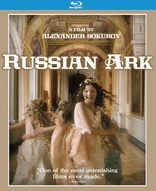Russian Ark Blu-ray Movie
HomeRussian Ark Blu-ray Movie 
Русский ковчег / Russkiy kovchegKino Lorber | 2002 | 99 min | Not rated | Nov 19, 2013
Movie rating
7.3 | / 10 |
Blu-ray rating
| Users | 0.0 | |
| Reviewer | 4.0 | |
| Overall | 4.0 |
Overview
Russian Ark (2002)
Alexander Sokurov's (Mother and Son) cinematic tour-de-force follows a modern filmmaker who magically finds himself transported to the 18th century. There, he embarks on a time-traveling journey through 300 years of Russian history. Filmed with a cast of thousands, three live orchestras and an army of technicians, Russian Ark is the longest uninterrupted shot in film history, and the first feature film ever created in a single take.
Starring: Sergei Dontsov, Mariya Kuznetsova, Leonid MozgovoyDirector: Aleksandr Sokurov
| Foreign | Uncertain |
| Drama | Uncertain |
| History | Uncertain |
| Fantasy | Uncertain |
| Mystery | Uncertain |
Specifications
Video
Video codec: MPEG-4 AVC
Video resolution: 1080p
Aspect ratio: 1.78:1
Original aspect ratio: 1.85:1
Audio
Russian: LPCM 2.0
Subtitles
English
Discs
50GB Blu-ray Disc
Single disc (1 BD)
Playback
Region A (locked)
Review
Rating summary
| Movie | 4.5 | |
| Video | 3.0 | |
| Audio | 4.0 | |
| Extras | 3.0 | |
| Overall | 4.0 |
Russian Ark Blu-ray Movie Review
Sokurov's single-take opus of Russian cultural history.
Reviewed by Casey Broadwater November 14, 2013There was significant buzz earlier this year regarding the uninterrupted 17-minute opening shot of Alfonso Cuarón's Gravity. As impressive as it
may be, it pales next to the logistical and artistic feat that is Alexander Sokurov's Russian Ark, a 2002 period piece of sorts—or periods
piece, rather, as it spans 300 years of Russian history—that was shot in a single 96-minute take with no hidden cuts or camera trickery. Of course,
nearly all of the great directors have experimented with long takes—Hitchcock and Welles, Ophüls and Antonioni, Ozu and Tarkovsky—but Sokurov's
commitment to the concept is almost unparalleled, largely because Russian Ark's form and content are so perfectly attuned. The technical
accomplishment and the film's thematic underpinnings are inseparable.
The film is, at its simplest, a guided tour of St. Petersburg's Winter Palace, a near-endless 1,500-room baroque structure that was home to the Russian
Tsars for 140 years. Under the reign of Catherine the Great, it also housed her own personal art collection, which provided the foundation for the State
Hermitage, one of the largest museums in the world. The Hermitage is Russia's central repository of culture and history, and Sokurov envisions it as a
figurative ark, carrying the motherland's precious cargo into the icy, uneasy waters of the future.

The Romanov Family, pre-Bolshevik Revolution
Our tour is guided by none other than Sokurov himself, who provides the mumbling voice of the film's narrator, the spirit of a nameless Russian man who died in "some accident" and is now unmoored in time, drifting through the gilded rooms and corridors of the Winter Palace, observing the past and present and slowly coming to terms with his own incorporeality. ("Can it be that I am invisible?") The camera serves as his first-person perspective, ghostly with the fluid Steadicam movements of Run Lola Run and Hanna cinematographer Tilman Büttner, whose own heavily choreographed performance is central to the film's tour de force success. He cuts through dancers and circles the action, pushes in on small details and glides as if on skates. Miraculously, he does all this while tethered to a focus-puller and a grip whose sole job it is to lug around a heavy backpack containing the camera's batteries and a massive hard drive on which to store the continuous stream of uncompressed video being captured. Russian Ark would've been impossible to make—at least, not without "cheat" cuts—before the advent of digital filmmaking.
The unseen narrator is joined by a fellow spirit, "The European" (Sergei Dontsov), a Frenchman based on the Marquis de Custine, a 19th century noble known for his highly critical travelogue, Empire of the Czar: A Journey Through Eternal Russia. The two ghosts come to represent the attitudes that western Europeans and Russians have typically held towards one another. Sokurov's anonymous Russian everyman is meek and defensive, while The European—dressed in all black, with Byronic hair and a bemused, above-it-all expression—is dismissive and even sarcastic. There's no respect in his voice when he calls Pushkin "your great poet, your beloved one," and he casually throws out jabs like "Russians are so talented at copying...because you don't have good ideas of your own."
Together, they give a running commentary over the series of time-skipping historical vignettes they witness from one room to the next. The hot- tempered Peter the Great dressing down one of his generals. Catherine (also the Great) running to the toilet after watching an elaborate musical spectacle. The ceremonial apology of a Persian emissary to Nicholas I after the death of a Russian ambassador in Tehran, and Nicholas II's daughters— including the now-fabled Anastasia—twirling through the palace halls in the comparatively happy times before the Bolshevik revolution. Only hinted at are the darker days of WWII: The European briefly opens one door that leads to a chilly storeroom filled with empty picture frames and a lone peasant building his own coffin during the 900-day siege of Leningrad. (The Marquis scoffs in disbelief when Sokurov's narrator mentions the number of those who eventually died.) Time moves inexorably forward, but the European opts not to follow the narrator into the future, preferring to stay in what we're meant to see as the height of Russian life and culture—an enormous 19th century ball with hundreds of elegantly dancing aristocrats and bombastic music from influential composer Mikhail Glinka.
This is a deeply Russian film—that sounds obvious, right?—not just because it's made by a Russian director and about Russian history, but because it seems made specifically for Russian audiences, for whom the film's soul-of-the-motherland content will unavoidably have a stronger resonance. The rest of us, like the European, are outsiders looking in, unable to get more than a tourist's grasp on its significance. And that's fine. It really is enough to simply sit in awe of Russian Ark's opulence—technical, artistic, and otherwise. The 2,000 member cast, attired in elaborate, period-accurate costumes made specifically for the film. The simultaneous sense of careful orchestration and wild, free-form energy. The weight and span of cultural history. It all serves to rectify the European's complaint that "Everyone can see the future, but no one remembers the past."
Russian Ark Blu-ray Movie, Video Quality 
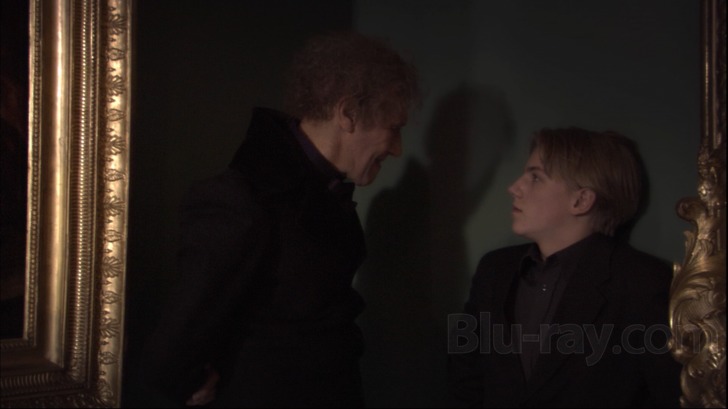
Russian Ark was among the first films to be shot completely in high definition, 24fps digital video, using the revolutionary Sony HDW-F900 camera that George Lucas used on Star Wars: Episode II the same year. The video was captured uncompressed, but it's important to remember that this camera's sensor—with its lower bit-depth and susceptibility to noise—is not nearly as sensitive or dynamically capable as the ones in use today. When it comes to the film's Blu-ray presentation, it's somewhat difficult to tell what picture quality quirks are inherent in the source material, and what may have been introduced in the prepping of this 1080p/AVC encode. For example, there are several instances where banding is distinctly noticeable in what should be fine color gradients. (See the wall in the screenshot above.) Whether this is a product of the originally low bit-depth—I believe the film was only captured in 8-bit color—or whether the image was significantly compressed later is hard to say. The same goes for the picture's abundance of digital chroma noise, which tends to cover darker and brighter scenes alike. I can say this, though: having seen the film's previous DVD release, the Blu-ray is a definite improvement in every way. Overall, clarity is on the soft side—I suspect it always was—but the amount of detail visible here easily trumps the standard definition image. Color is richer too. It's amazing how far digital filmmaking has come in the past decade, and we have films like Russian Ark to thank for pushing the boundaries of what's possible with the medium.
Russian Ark Blu-ray Movie, Audio Quality 
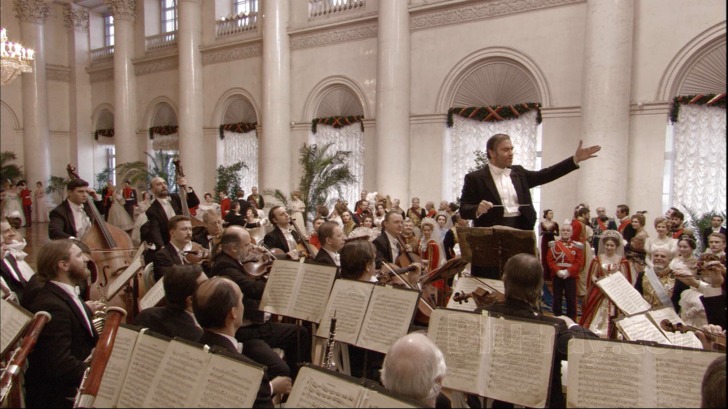
It should come as no surprise that all of the film's audio was dubbed in post-production, allowing Sokurov to give direction on set (and Tilman Büttner to curse whenever he made a slight mistake, as he mentions in the making-of documentary). The dubbing is obvious from the first frames—the lips rarely seem to match up perfectly—but this adds, in a strange way, to the film's theater-like artifice. It works. And so does the film's uncompressed Linear PCM 2.0 track, which has a decent sense of stereo separation, strong clarity, and good range. The music, in particular, from the incidental orchestra arrangements to composer Sergey Yevtushenko's gorgeous piano theme, sounds wonderful. If you speak Russian, I imagine some of the dialogue might be hard to follow, as it often overlaps—and, in Sokurov's case, is often mumbled—but the optional English subtitles keep things clear for the rest of us.
Russian Ark Blu-ray Movie, Special Features and Extras 
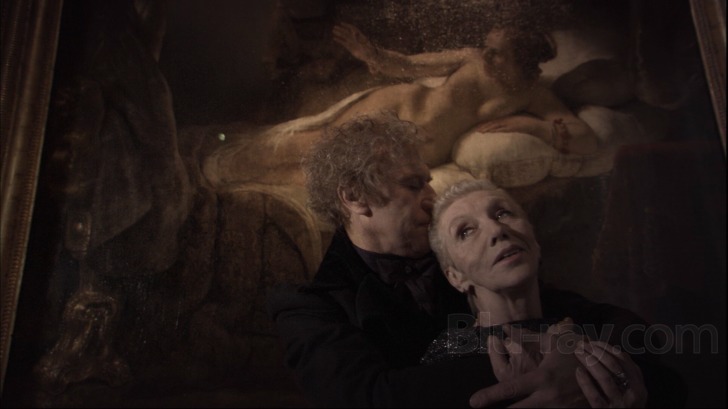
- In One Breath (SD, 43:41): An exhaustive making-of documentary about the film's intense single-day, single-shot production, which took four tries to complete. (They decided to start over if any mistakes were made during the first twenty minutes.) Features extensive interviews with director Alexander Sokurov, cinematographer Tilman Büttner, and film critic Rich Holloway.
- Trailer (SD, 1:44)
Russian Ark Blu-ray Movie, Overall Score and Recommendation 
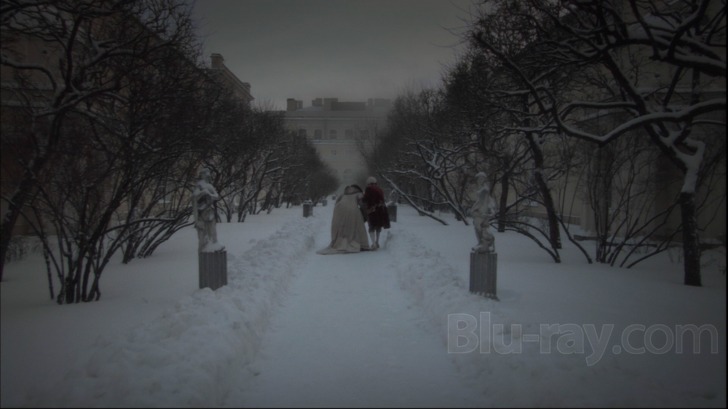
Tour de force is an overused descriptor when it comes to cinema, but if it applies anywhere, it applies to Russian Ark, a bravura piece of filmmaking that marries technical accomplishment—the intense choreography of nailing a single 96-minute shot—with artistic insight into the soul of Russian culture. The single take premise might sound like a gimmick, but it proves to be a beautiful, dream-like way to move seamlessly through 300 years of history. There really is nothing like it, even simply as an experiment in the capabilities of early digital moviemaking. Make sure to watch the included making-of documentary to get a fuller sense of the insane logistics required to get Russian Ark seaworthy. Despite a few picture quality issues—which may or may not date to the source material—this one arrives highly recommended!
Similar titles
Similar titles you might also like

The Marquise of O
Die Marquise von O / Slipcover in Original Pressing
1976

The Tree of Wooden Clogs
L'albero degli zoccoli
1978

Black Venus
Vénus noire
2010

Mysteries of Lisbon
Mistérios de Lisboa
2010

Fellini Satyricon
1969

The Story of Adele H.
1975

Ludwig
1973

Danton
1983

City of Life and Death
南京!南京! / Nanjing! Nanjing!
2009

The Ballad of Narayama
Narayama bushikô
1983

A Taxi Driver
택시운전사 / Taeksi woonjunsa
2017

Zama
2017

Kameradschaft
Comradeship
1931

Faust
2011

Tartuffe
Herr Tartüff
1925

La Marseillaise
The Marseillaise
1938

Liberté
2019

Viva l'Italia
Garibaldi
1961

The Third Wife
Người vợ ba / Slipcover in Original Pressing
2018

Woyzeck
1979
